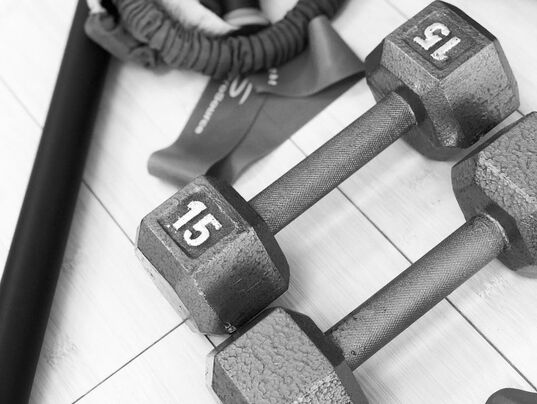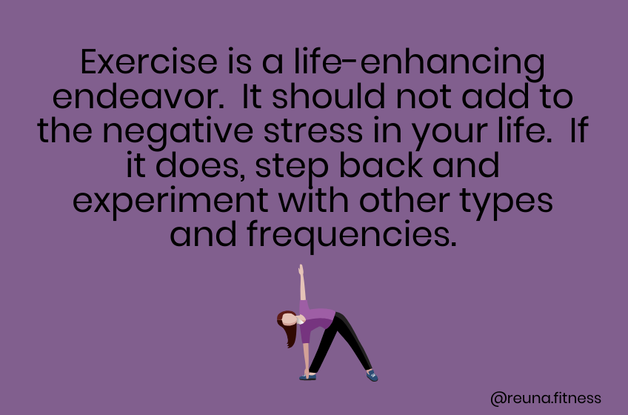|
Time and energy may be the most commonly cited reasons for not exercising consistently but based on some recent conversations with women I know, emotions and attitudes about exercise play a big role as well. Discussions involving exercise, working out, or fitness have the potential to bring up all sorts of negative emotions including dread, shame, and guilt. Starting in the teen years, many of us viewed exercise as a means to shrink ourselves, to burn calories, or to “undo” what we ate and drank last weekend. Exercise was merely a way to change our bodies into a more preferred size or shape. It was not done out of self-love or self-acceptance so it didn’t often feel very good. For some, these views persist well into adulthood and the struggle with exercise continues. Even when the negative views slowly fall away and we wave the white flag in the body battle, the guilt tends to stick around. Exercise guilt can occur in one of two ways: guilt associated with not exercising enough or guilt for exercising because it takes away from other priorities such as care-taking, earning money, etc. In the first type of exercise guilt, exercise is equated with being good. “I was good. I made it to the gym today." "I was bad. I didn't exercise at all last week." Sound familiar? We all know that exercising is associated with a lot of positive outcomes. However, if you are too focused on those outcomes, it can become a source of stress and guilt. You know you "should" but you aren't so you feel badly. Maybe you can relate to feeling guilty about:
I was good. I exercised today. In the second type of exercise guilt, taking time to exercise is thought of as neglecting other responsibilities. This guilt stems from feeling selfish because exercise requires time and energy that could be used elsewhere. Maybe you can relate to feeling guilty for:
Many of us will experience exercise guilt of some variety at some point in our lives. Whether you can relate to the first type of exercise guilt or the second (or possibly both), the negative feelings can hold you back from achieving wellness goals or simply feeling your best. How do you let them go? The first step is awareness. Recognize the attitudes and emotions you have been holding onto for years. Exercise is not a moral choice even though most of us have been conditioned to think of it that way. Yes, in many ways it is good for you but doing it doesn’t make you good or better than anyone else. And not exercising doesn’t make you bad or worse than anyone else. Choosing to exercise or not exercise when you have children doesn’t make you a bad mom. Choosing to spend money on a fitness membership or trainer doesn’t mean you're selfish. Whether you exercise almost daily or rarely, it has nothing to do with your worthiness as a woman, a partner, a mother, or human being. Why, how, and when you exercise is as individual as you are. Change your focus. The first type of exercise guilt can be intensified when exercise is solely associated with specific outcomes. Not exercising means you aren’t losing weight as quickly or changing that body part or improving your health. If you view exercise only in terms of those outcomes, it can feel like a burden. It is a responsibility that you are failing at completing. If you view exercise as an activity that enhances your life right now, it tends to feel lighter. Focusing on benefits such as gaining strength, rising to the challenge, social connection with others, the endorphins, the sense of accomplishment, etc. can make it easier to see how exercise fits in with your overall well-being right now. Creating goals around a desired outcome is a part of developing healthy habits. However, the process matters. Finding enjoyment and satisfaction in what you are doing is important. The big picture matters too; sometimes your life, health, or happiness requires a reduction in exercise and physical activity. The second type of exercise guilt stems from focusing on what exercising takes away. As with any choices in life, you’ve got some trade-offs. Time, energy, and money are what we tend to zero in upon. A regular exercise habit always requires time and energy and occasionally requires money. That’s just one part of the trade-off equation though. What does consistent exercise add to your life? Taking care of yourself physically, mentally and emotionally via exercise benefits your family and everyone around you. When you show your family that you are making your well-being a priority, you’re being a great role model. When you finish your workout and return in a better mood, that’s win-win. And it’s not just about others. Exercising can provide greater mental clarity making the time spent at work more productive. Look at the trade-offs on both sides and then decide what amount of time and energy exchange makes sense for you.
Are you ready to work on building that consistent exercise habit while losing the guilt? Try these tips: 1. Be specific. Add what, when, and where to your calendar. For example: 40 minute strength circuit Wednesday morning at 5:45 am in the living room. 2. Set yourself up for success. Place your equipment and mat in the space the evening before. Get your clothes out. Make it as easy and simple as possible to do what you plan to do. (If you aren’t sure what to do, hire a fitness professional.) 3. Start small. Choose a frequency and duration that you are confident you can achieve. For the first two weeks, commit to a single session. Assess how it feels to you physically as well as mentally. How does it fit into your current schedule? Play around with the number of sessions per week to find your sweet spot. It may be 1 or 2. Even if you bump it up to three or more eventually, the single session option is always available to you if life gets hectic. 3. Put it out there so you hold yourself accountable. Tell a friend or post on social. 4. Speaking of social, unfollow accounts that make you feel badly about your body or what you are doing or not doing in the gym. I have unfollowed several fitness “influencers” for that reason. 5. Give yourself permission to modify your plans. You really don’t wanna do it but it’s on your calendar! Instead of skipping altogether, what if you did something lighter and shorter? Sometimes going hard isn’t the right choice for your body or your brain. Try a less intense or shorter version of what you planned to do. 6. Make it a friendly or family affair. Try a weekly physical activity that involves your family or friends. No shortage of options is available. (Hint: google can help you out with ideas.) 7. Celebrate all the wins! Picked up a heavier weight this time? Added 0.25 miles to your walk? Made a new friend at the gym? Consistently got in a weekly session this month? Acknowledging these wins, even if small, can reinforce your habit and the positive feelings associated with it. It will take time to shift to a more positive place and lose that exercise guilt. I previously used phrases "good" and "bad" to talk about myself based on how I was exercising and eating at the time. I did this for years. It doesn't change overnight and takes awareness of self-talk and a change of focus. Occasionally, I still feel the exercise guilt creep back...sometimes for spending too much time and energy on exercise and sometimes for not doing enough. Then I remember (as mentioned above): Exercise is a life-enhancing endeavor. It shouldn’t add to the negative stress in life. If it does, it’s time to evaluate! Thank you for reading. I'm interested in your experience with exercise guilt. Do you feel guilty when you don't exercise? Do you feel guilty when you do? How have these feelings influenced your fitness habits? ________________________________________________________________________ It can be difficult to navigate all the "shoulds" when it comes to health and fitness. If you are ready for a coach who can help guide you in finding your fit, contact me.
6 Comments
8/17/2022 01:29:11 am
Use of simple words motivated me to read ahead. I never otherwise spend so much time going through blogs.
Reply
11/1/2022 02:51:13 am
Thanks for the blog on exercises to deal with health complications without stressing out much.
Reply
4/2/2023 08:31:42 am
Thank you for this article. It was very useful as I was searching for it from past few time and it helped me a lot. Thanks again.
Reply
Candy Moore
11/16/2023 10:57:46 pm
Nice article, this will help me in daily workout and Well, everyone is strugling to trim down. But there is one <a href="https://hipilates.com.au/>fitness</a> and wellness studio that helped me and friends a lot. Satisfaction guarranteed here.
Reply
11/22/2023 04:31:05 am
Fantastic piece! Your insights into exercise guilt resonate, addressing emotional complexities. The distinction between guilt types is insightful, and your call for self-awareness is empowering. Practical tips make it actionable, and your personal touch adds relatability. Looking forward to more! For additional support on women's wellness, explore resources at wynatlife.com. Keep inspiring!
Reply
Leave a Reply. |
Archives
June 2023
Categories
All
|


 RSS Feed
RSS Feed